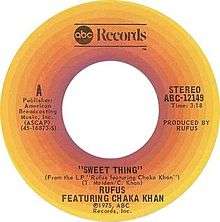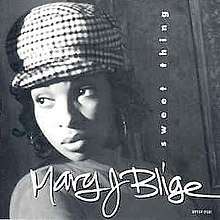Sweet Thing (Rufus song)
"Sweet Thing" is a song performed by American funk and R&B band Rufus with vocals by band member Chaka Khan. Initially recorded and released a single in late 1975, it was first a hit with Rufus featuring Chaka Khan when they recorded the song in 1975, eventually reaching number-one on the R&B singles chart and number five on the pop chart.[1] The song was co-written by Khan (for her then husband, Richard Holland) and Rufus bandmate Tony Maiden and became one of the band and Khan's signature songs. The record appears on the band's fourth album Rufus featuring Chaka Khan (1975).
| "Sweet Thing" | ||||
|---|---|---|---|---|
 Side-A label of U.S. 7-inch vinyl single | ||||
| Single by Rufus featuring Chaka Khan | ||||
| from the album Rufus featuring Chaka Khan | ||||
| Released | November 28, 1975 | |||
| Recorded | 1975 | |||
| Genre | ||||
| Length | 3:19 | |||
| Label | ABC | |||
| Songwriter(s) |
| |||
| Producer(s) |
| |||
| Rufus featuring Chaka Khan singles chronology | ||||
| ||||
In 2009, Essence magazine included the song in their list of the "25 Best Slow Jams of All Time".[2]
Charts
| Chart (1975) | Peak position |
|---|---|
| US Billboard Hot 100[3] | 5 |
| US Hot R&B/Hip-Hop Songs (Billboard)[4] | 1 |
Cover versions
In 1997, contemporary jazz saxophonist Boney James did another remake of the song; it was included on the album titled Sweet Thing. The album's title track included background vocals by original co-writer Tony Maiden.[5][6] A year later, Khan recorded it again for the New York Undercover: a Night at Natalies soundtrack, released in 1998.
UK soul singer Beverley Knight has also recorded a version of the song. Knight's version was recorded for a BBC Radio 2 session and was included as the B-side to her 2004 single "Not Too Late for Love". Due to the popularity of Knight's version with her fans, it was later included on her Voice - The Best of Beverley Knight (2006) compilation. Knight has since been invited to perform the song at Khan's London O2 Arena date on her UK tour, after collaborating with the singer on her Blige duet "Disrespectful" at the Montreux Jazz Festival.
Mary J. Blige version
| "Sweet Thing" | ||||
|---|---|---|---|---|
 | ||||
| Single by Mary J. Blige | ||||
| from the album What's the 411? | ||||
| Released | April 2, 1993 | |||
| Recorded | 1992 | |||
| Genre | ||||
| Length | 3:44 | |||
| Label | MCA | |||
| Songwriter(s) |
| |||
| Producer(s) |
| |||
| Mary J. Blige singles chronology | ||||
| ||||
In 1992, American singer Mary J. Blige recorded a rendition for her debut album What's the 411? (1992). It became Blige's third top 40 on the US Billboard Hot 100, reaching number 28. In addition, it marked Blige's first entry on the New Zealand Singles Chart. Blige also performed the song live on the eighteenth season of Saturday Night Live on March 13, 1993.
Credits and personnel
Credits adapted from the What's the 411? liner notes.[7]
- Sean "Puffy" Combs – executive producer
- Charlie Davis – executive producer
- Mark Morales – producer
- Mark C. Rooney – producer
- Kurt Woodley – executive producer
Charts
| Chart (1993) | Peak position |
|---|---|
| New Zealand (Recorded Music NZ)[8] | 48 |
| US Billboard Hot 100[9] | 28 |
| US Hot R&B/Hip-Hop Songs (Billboard)[10] | 11 |
References
- Whitburn, Joel (2004). Top R&B/Hip-Hop Singles: 1942-2004. Record Research. p. 505.
- "25 Best Slow Jams of All Time".
- "Rufus Chart History (Hot 100)". Billboard. Retrieved April 8, 2017.
- "Rufus Chart History (Hot R&B/Hip-Hop Songs)". Billboard. Retrieved April , 2017.
- Widran, Jonathan. "Sweet Thing - Boney James | Songs, Reviews, Credits". AllMusic. Retrieved 2016-10-10.
- "Archived copy". Archived from the original on 2010-03-26. Retrieved 2010-05-24.CS1 maint: archived copy as title (link)
- Blige, Mary J. (1992). What's the 411? (Liner Notes) (Compact Disc). Mary J. Blige. Uptown Records.
- "Charts.nz – Mary J Blige – Sweet Thing". Top 40 Singles. Retrieved April 8, 2017.
- "Mary J. Blige Chart History (Hot 100)". Billboard. Retrieved April 8, 2017.
- "Mary J. Blige Chart History (Hot R&B/Hip-Hop Songs)". Billboard. Retrieved April , 2017.